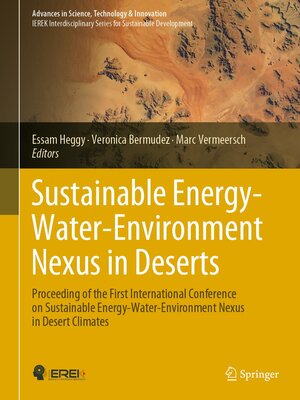Sustainable Energy-Water-Environment Nexus in Deserts
ebook ∣ Proceeding of the First International Conference on Sustainable Energy-Water-Environment Nexus in Desert Climates · Advances in Science, Technology & Innovation
By Essam Heggy

Sign up to save your library
With an OverDrive account, you can save your favorite libraries for at-a-glance information about availability. Find out more about OverDrive accounts.
Find this title in Libby, the library reading app by OverDrive.



Search for a digital library with this title
Title found at these libraries:
| Library Name | Distance |
|---|---|
| Loading... |
This book addresses challenges and opportunities in the Energy-Water-Environment (EWE) nexus, with a particular focus on research and technology development requirements in harsh desert climates. Its chapters include selected contributions presented during the 1st international conference on sustainable Energy-Water-Environment nexus in desert climates (ICSEWEN-19) held at the Qatar Environment and Energy Research Institute (QEERI) in Doha, Qatar in December 2019. This volume is comprised of three main chapters, each describing important case studies and progress on water, energy and environmental questions. A fourth chapter on policies and community outreach on these three areas is also included. This compilation aims to bridge the gap between research and industry to address the socioeconomic impacts of the nexus imbalance as perceived by scientists, industrial partners, and policymakers. The content of this book is of particular importance to graduate students, researchers and decision makers interested in understanding water, energy and environmental challenges in arid areas. Re searchers in environmental and civil engineering, chemistry, hydrology and environmental science can also find unique in-situ observations of the current nexus imbalance in deserts climate to validate their investigations. It is also an invaluable guide for industry professionals working in water, energy, environment and food sectors to understand the rapidly evolving landscape of the EWE nexus in arid areas. The analyses, observations and lessons-learned summarized herein are applicable to other arid areas outside North Africa and the Arabian Peninsula as well, such as central Australia, the southwest of the United States and deserts in central Asia.







